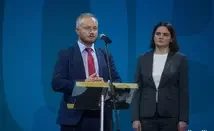U jakija hulni hulaje prezident Biełarusi za śpinaj u Rasii?
U rasparadžeńni «Ruskaha reparciora» apynułasia listavańnie Dziarždepartamienta ZŠA, jakoje datyčyć Biełarusi, tut my publikujem niekatoryja z tysiač depiešaŭ.
Hetyja dakumienty, pradstaŭlenyja sajtam WikiLeaks, demanstrujuć, nakolki vynachodliva Alaksandr Łukašenka handluje svaimi antyrasijskimi nastrojami, sprabujučy damahčysia ad zachodnich krain palityčnaj padtrymki i ekanamičnaj dapamohi.
«Rasija spravakavała vajnu ŭ Hruzii»
Raskrytaj atrymałasia asabistaja sustreča Alaksandra Łukašenki ź ministram zamiežnych spravaŭ Estonii Urmasam Paetam u kastryčniku 2009 hoda. U spravazdačy ab sustrečy (hł. dakumient 1) havorycca: «Zapeŭniŭšy Paeta, što Estonija nikoli nie była jaho voraham, Łukašenka pravioŭ bolšuju častku svajoj
Razam z tym Łukašenka daŭ zrazumieć, što starajecca ŭstrymlivacca ad publičnych prahruzinskich akcyj. Tak, jon atrymaŭ ad Michaiła Saakašvili zaprašeńnie naviedać Hruziju, ale «nie zrabiŭ hetaha, bo nie chacieŭ razdražniać Kreml».
Z hutarki robicca vidavočnym, što Łukašenka admoviŭsia pryznać niezaležnaść Abchazii i Paŭdniovaj Asiecii, raźličvajučy ŭ abmien atrymać ekanamičnuju dapamohu z boku ES: «Łukašenka śćviardžaŭ, što addaje pieravahu tamu, kab Biełaruś była niezaležnaj, i byŭ asabliva zasmučany, što ES nie daŭ jamu kredytu na praviadzieńnie reformy abo na jaho niepryznańnie Paŭdniovaj Asiecii i Abchazii».
Heta prymusiła Łukašenku zadumacca ab nieabchodnaści supracoŭnictva ź ES. Jak charakterny prykład Łukašenka pryvioŭ Ukrainu. Prezident Biełarusi «śćviardžaŭ, što Ukraina raspačała šmatlikija reformy, kab „spadabacca“ ES i NATO, ale ŭ vyniku ciapier Ukraina nie bližejšaja da siabroŭstva ŭ hetych arhanizacyjach, čym raniej, i akramia taho, znachodzicca ŭ ekanamičnym i palityčnym kryzisie».
Łukašenka spadziavaŭsia, što prajekt Nordstream pravalicca
«Łukašenka padtrymlivaŭ antyrasijski ton na praciahu sustrečy, — adznačajecca dalej u dakumiencie Dziarždepartamienta ZŠA, — Łukašenka skazaŭ, što spadziavaŭsia, što Finlandyja, Šviecyja i Danija admoviacca dać dazvoł na budaŭnictva trubapravoda Nordstream». Zamienaj hetamu prajektu Łukašenka bačyŭ hazapravod na terytoryi Biełarusi Jamał II i śćviardžaŭ, što jaho budaŭnictva abyšłosia b u 10 razoŭ tańniej, čym prakładka Nordstream pa dnie Bałtyjskaha mora.
U cełym z dakumientaŭ vidać, što Alaksandr Łukašenka imkniecca vieści aktyŭny dyjałoh prynamsi z susiednimi krainami, aryjentavanymi na Zachad, — pra heta śviedčać spravazdačy pra vizity Łukašenki ŭ Kijeŭ i Vilniu (hł. dakumienty 2 i 3, adpaviedna). Spačatku ŭspryniaŭšy «aranžavuju revalucyju» va Ukrainie jak niebiaśpieku dla siabie asabista, Łukašenka ŭ niejki momant naładziŭ dyjałoh ź Viktaram Juščankam, i raniejšaja ŭkrainskaja administracyja karystałasia hetym: «Poŭnaja stratehičnaja meta sustrečy na najvyšejšym uzroŭni była ŭ tym, kab zaachvocić Łukašenku raźvivać šmatviektarnuju zamiežnuju palityku i adymać jaho ad hrudziej Rasii. Adzin analityk taksama skazaŭ nam, što… abiedźvie krainy byli achviarami rasijskich „hazavych vojnaŭ“ i što Ukraina maje šaniec vyjhrać ad pryciahnieńnia Biełarusi ŭ nieaficyjnuju hrupoŭku, jakaja składajecca ź dziaržaŭ HUAM, Bałtyi i Polščy».
Dziaržsakratar ZŠA Chiłary Klintan u svajoj depiešy dla ambasady Biełarusi (hł. dakumient 4) užyvaje jašče adzin arhumient dla pieraaryjentacyi zamiežnaj palityki Biełarusi: «Biełaruski ŭrad pavinien viedać, što dla Biełarusi važniej mieć lepšyja adnosiny z nami, čym dla nas — mieć lepšyja adnosiny ź Biełaruśsiu. Zaležnaść Biełarusi ad źmienlivaha rasijskaha rynku aznačaje, što jaje mahčymaści ekanamičnaha rostu lažać na Zachadzie (pavodle statystyki biełaruskaha ŭrada, ES — u cełym užo samy vialiki zamiežny rynak Biełarusi)».
Łukašenka ličyŭ Miadźviedzieva roŭnym Pucinu
Ź listavańnia Dziarždepartamienta ZŠA robiacca zrazumiełyja i niekatoryja pryčyny apošnich
Łukašenka vypraŭleńniu nie paddajecca
Z dypłamatyčnaha listavańnia vynikaje, što, sprabujučy iści na zbližeńnie z zachodnimi krainami, Alaksandr Łukašenka ŭ davoli žorstkaj formie adkidaje ŭsie sproby damahčysia istotnaha źmiakčeńnia svajoj unutranaj palityki. Chiłary Klintan adznačaje: «I kiraŭnik administracyi prezidenta Uładzimir Makiej, i ministr zamiežnych spravaŭ Siarhiej Martynaŭ skazali, što Biełaruś chacieła b palepšyć adnosiny z Zachadam i što ŭrad budzie pravodzić reformy ŭnutranaj palityki. [Ale] usio, što my pačuli, źjaŭlajecca niapeŭnaj rytorykaj biez
«Razam pili harełku i raspuśničali»
Alaksandr Łukašenka davoli prynižalna havoryć pra biełaruskuju apazicyju, choć pry hetym nie idealizuje i svajo maralnaje abličča. Sa spravazdačy ab sustrečy z Urmasam Paetam: «Łukašenka adkazaŭ, što jon i niekalki siabraŭ apazicyi kaliści byli sajuźnikami, jakija «razam pili harełku i raspuśničali». Adnak hetyja ludzi zrabilisia jaho apanientami paśla taho, jak jon admoviŭsia pavysić ich. Łukašenka skazaŭ Paetu, što apazicyja ŭ Biełarusi nikoli nie abjadnajecca i isnuje tolki «za košt zachodnich hrantaŭ». Akramia taho, Łukašenka śćviardžaŭ, što moh by spynić patok hrošaj na hranty ŭ luby čas, ale nie bačyć u hetym nieabchodnaści, tamu što tyja, chto ich atrymlivaje, «biaśpiečnyja».
Napiaredadni prezidenckich vybaraŭ cikavaje i pryznańnie Alaksandra Łukašenki, što jon sam karektuje ich vyniki. Praŭda, nie ŭ bok pavieličeńnia, a ŭ bok źmianšeńnia kolkaści hałasoŭ, padadzienych za jaho kandydaturu. U pierakazie jaho hutarki z Urmasam Paetam jość nastupny fakt: «Łukašenka taksama paŭtaryŭ bolš rannija śćvierdžańni, što na vybarach 2006 hoda jon faktyčna atrymaŭ 93% hałasoŭ, ale pamienšyŭ vynikovuju ličbu da 86%, kab zrabić vyniki hałasavańnia bolš praŭdapadobnymi dla Zachadu».
Z depiešaŭ možna daviedacca i niekatoryja inšyja cikavyja detali. Naprykład, Łukašenka prapanoŭvaŭ Hrybaŭskajcie razam sustrecca z prezidentam Juščankam, kab padtrymać taho napiaredadni prezidenckich vybaraŭ va Ukrainie. Adnak Hrybaŭskajcie admoviła.
Łukašenka prapanoŭvaŭ Hrybaŭskajcie dałučycca pad pabudovy Astravieckaj AES, adnak jana admoviła: «Nie majcie iluzij. Stratehičnaja zadača Litvy — dałučycca da jeŭrapiejskich elektrasietak».
Litoŭski dypłamat, jaki apisvaje amierykanskamu kalehu sustreču z Łukašenkam, adznačaje, što Łukašenka vałodaŭ usimi temami, a jahonyja pamočniki ŭ časie sustreč nie vymavili ni słova.
Z depiešy ž Klintan u Minsk vynikaje, što Amieryka ćviorda patrabuje ad Minska prahresu ŭ halinie demakratyi i pravoŭ čałavieka, tady jak łukašenkaŭcy chacieli b abmiežavacca hieapalityčnymi pieramienami.
Voś poŭnyja teksty depiešaŭ.
1. SPRAVAZDAČA PRA SUSTREČU ALAKSANDRA ŁUKAŠENKI Ź MINISTRAM ZAMIEŽNYCH SPRAŬ ESTONII URMASAM PAETAM
C O N F I D E N T I A L SECTION 01 OF 03 TALLINN 000317 SIPDIS DEPT FOR EUR/UMB JOE WANG VILNIUS FOR MINSK MICHAEL SCANLON AMEMBASSY ANKARA PASS TO AMCONSUL ADANA AMEMBASSY ASTANA PASS TO USOFFICE ALMATY AMEMBASSY BERLIN PASS TO AMCONSUL DUSSELDORF AMEMBASSY BERLIN PASS TO AMCONSUL LEIPZIG AMEMBASSY BELGRADE PASS TO AMEMBASSY PODGORICA AMEMBASSY HELSINKI PASS TO AMCONSUL ST PETERSBURG AMEMBASSY ATHENS PASS TO AMCONSUL THESSALONIKI AMEMBASSY MOSCOW PASS TO AMCONSUL VLADIVOSTOK AMEMBASSY MOSCOW PASS TO AMCONSUL YEKATERINBURG E.O. 12958: DECL: 2019/10/30 TAGS: PREL, PGOV, BO, EN SUBJECT: Estonian FM Visit to Belarus; Lukashenko Goes On (and On and On) CLASSIFIED BY: Marc Nordberg, Political/Economic Chief; REASON: 1.4(B), (D) Classified by CDA Karen Decker for Reasons 1.4 B and D.
1. (C) Summary: Pol Chief met with MFA Desk Officer for Belarus, Moldova, and Central Asia Risto Roos on October 28 for a read-out of Foreign Minister Urmas Paet's October 20 - 21 visit to Minsk. Lukashenko, assuring Paet that Estonia was not his enemy, spent the bulk of their 90-minute meeting lashing out at Russia with claims that Minsk may be forced to recognize South Ossetia and Abkhazia this winter in order to get cheap gas from Russia, and that Russia had instigated the war in Georgia. Lukashenko was unrepentant on repression against civil society and has ordered his government to do nothing to please the EU before the November GAERC discusses lifting sanctions against Belarus. End summary.
2. (SBU) On October 20 - 21, FM Paet led a delegation of 30 Estonian business people (Estonia's largest ever business delegation) to Minsk. While in Belarus, Paet upgraded Estonia's Consulate to an Embassy, and separately met with Aleksandr Lukashenko, FM Sergey Martynov, and a group of Belarusan independent NGOs and opposition parties. Lukashenko: "Estonia is Not Our Enemy," But Maybe Russia Is --------------------------------------------- ---------------------- --------
3. (C) Civil Society: Paet's meeting with Lukashenko was scheduled to last 30 minutes, but went 90 minutes and only ended when Paet said he needed to catch his flight. Roos said Lukashenko's office told him this was only the third time that a meeting with Lukashenko had gone longer than planned (the others being Javier Solana and Benito Ferrero-Waldner). In the meeting Paet raised complaints from civil society leaders that political parties were not allowed to register or freely operate, and that security forces were increasingly using violence against demonstrators. Lukashenko replied that he and several members of the opposition had once been allies who "drank vodka and womanized together." However, these people had turned against him (Lukashenko) after he refused to give them promotions. Lukashenko told Paet that the opposition in Belarus would never unite, and only existed "to live off western grants." Furthermore, Lukashenko claimed that he could halt the flow of grant money at any time, but that he saw no reason to do so, since the parties were "harmless." Regarding civil society complaints of violence against them, Lukashenko stated the opposition should expect to get hurt when they attack the OMON (riot police). Lukashenko also claimed Belarus has no political prisoners, but that common crooks join the opposition after they are arrested in order to claim political persecution. Lukashenko added that he did not want to be president, but was only acting to help the Belarusan people. Lukashenko also repeated earlier claims that in the 2006 elections he actually received 93 percent of the vote, but reduced the final tally to 86 percent to make the vote more credible to the West.
4. (C) NATO: Lukashenko told Paet that, despite Estonia's membership in the EU and NATO, he did not consider Estonia to be an enemy. Lukashenko also said that Latvia, Lithuania and Poland were not threats to Belarus, despite being NATO members. Paet argued that NATO should not be considered as an enemy, but according to Roos, Lukashenko did not buy it. TALLINN 00000317 002 OF 003
5. (C) EU: Lukashenko also told Paet stated that the EU's "ridiculous sanctions" had not weakened Belarus. In fact, Lukashenko told Paet he had specifically ordered his government, "to do nothing to please the EU" before the EU discusses extending sanctions at the November GAERC. Lukashenko argued that he prefers Belarus to be independent, and was particularly upset that the EU has not given him credit for any reforms or for his non-recognition of South Ossetia and Abkhazia. He claimed that Ukraine undertook numerous reforms to "please" the EU and NATO, but that now Ukraine is no nearer membership in either organization and is in economic and political ruin. Lukashenko added that the EU, "can sleep soundly at night," because Belarus protects the EU's border from illegal immigrants. He lamented that the EU does not give Belarus any credit for this.
6. (C) Iraq, Iran and Venezuela: Lukashenko claimed to Paet that Saddam Hussein called him in early 2003, asking Lukashenko to negotiate peace with the United States. Lukashenko claimed Hussein was prepared to offer gas at half price, and had argued that Iraq had no ties to al-Qaeda nor any WMD. Lukashenko also claimed that Belarus was forced to seek friendship with Venezuela and Iran to lessen Belarus' energy dependence on Russia. Those countries help Belarus as much as they can, but Lukashenko lamented that his country is still dependent on Russia.
7. (C) Russia: Roos told us that Lukashenko maintained an anti-Russian tone throughout the meeting. Lukashenko said he hoped Finland, Sweden and Denmark refuse to give permission to build the Nordstream pipeline. Lukashenko would prefer to see Yamal II (crossing Belarus) built, arguing it would cost one-tenth the price. Lukashenko also claimed he would likely be forced to recognize South Ossetia and Abkhazia this winter in order to get cheaper energy from Russia. He also complained that Russian media is full of falsifications. On Georgia, Lukashenko claimed Russia had planned the war years in advance and tricked Saakashvili into acting, and told Paet Saakashvili had invited him to Georgia. Lukashenko was considering accepting this invitation, but had not yet done so since he did not want to annoy the Kremlin. Beleaguered Civil Society -------------------------------
8. (C) Paet met with NGO and political party representatives, who said the level of repression they face has worsened over the past six months. They reported that it has gotten even harder to get permission to demonstrate, that security services are more frequently using force to break up unsanctioned demonstrations, and that activists face violence more often after being arrested. The civil society group accused Russia of propping up Lukashenko with cheap oil and gas, and claimed Russia is trying to "Russify" Belarus as it pushes Minsk into accepting a union state. FM Martynov Defends Status Quo -----------------------------------------
9. (C) Paet presented the civil society complaints to FM Martynov, who argued that Belarus was reforming, but that reform takes time. TALLINN 00000317 003 OF 003 Martynov claimed there was a debate within the GOB between a faction that is pro-reform, and others that want to halt reforms since the EU has not positively responded. Martynov reiterated Lukashenko's complaints that Belarus has not been properly thanked for refusing to recognize South Ossetia, and has not gotten any credit from the EU for decreasing its use of the death penalty. Martynov then accused the EU of double standards, since sanctions are being lifted against Uzbekistan but not against Belarus. Martynov also said that Belarus would upgrade its Consulate in Tallinn to an Embassy in six to nine months, and that the GOB wants to create an inter-governmental commission with Estonia to discuss payment of pensions, social issues, tourism, and cultural issues.
10. (C) Comment: The GOE is an active supporter of democratic reform in Belarus, even if Belarus is not one of Estonia's main foreign policy priorities (which are Afghanistan, Georgia, Ukraine and Moldova). The Estonian MFA is providing 115,045 Euro in scholarships to thirteen Belarusan students removed from university for political reasons, and in 2008 gave 28,761 Euro to the European Humanities University for scholarships (EHU is a private Belarusan university currently operating in Vilnius). In recent years Estonia has granted political asylum to several young Belarusan pro-democracy activists, such as Pavel Morozow of the Third Way NGO. Estonia's Charge in Minsk told Pol Chief before his assignment that he intends to push hard for democratic transition in Minsk. Given Estonia's own transition experience, and the fact that Estonia is not an "enemy" of Belarus, the GOE's modest support and efforts could have some traction. We are actively engaged with the GOE on ways we can maximize support to Belarus' democratic opposition, and have made some useful connections (at least for us) to link up Embassies in Tallinn and Minsk with the Estonian Foreign Ministry and now, the Estonian Embassy in Minsk. We hope to be able to reinforce our national efforts to promote change in Belarus by triangulating, where we can, our assistance. DECKER
2. SPRAVAZDAČA PRA VIZIT ALAKSANDRA ŁUKAŠENKI Ŭ VILNIU
C O N F I D E N T I A L SECTION 01 OF 02 VILNIUS 000495 SIPDIS E.O. 12958: DECL: 09/24/2019 TAGS: LH, PGOV, PHUM, PREL, BO SUBJECT: LUKASHENKA'S VISIT TO VILNIUS Classified By: CDA Damian R. Leader for reasons 1.4(b) and (d).
1. (C) Summary. Belarusian President Alexander Lukashenka recently concluded his first visit to Lithuania since 1998. During the September 15-16 visit, Lukashenka met with Lithuanian President Dalia Grybauskaite and other officials and delivered a speech at the Lithuania - Belarus Economic Forum. Grybauskaite emphasized to Lukashenka that the GOB needs to show progress on the EU's Five Conditions for Belarus before November in order for the EU to continue suspension of its sanctions. She also expressed concern regarding the GOB's plan to build a nuclear power plant near the Lithuanian border. Both Presidents signed several agreements on the administration of their countries' border region. End summary. --------------------------------- Lithuania Emphasizes Human Rights ---------------------------------
2. (C) On September 18 Grybauskaite's foreign policy advisor Darius Semaska discussed the Lukashenka visit with Charge, and poloff further discussed the visit with MFA's Belarus Division Head Laurynas Jonusauskas on September 22. Semaska said Grybauskaite's meeting with Lukashenka was divided into three parts, each of about 45 minutes: a tte--tte; a meeting with foreign ministers and advisors; and a final meeting with full delegations and other Ministers including the Minister of Energy and the Minister of Transportation. Grybauskaite raised the EU's Five Conditions in all three meetings, and this issue took up more than half of each meeting. According to Semaska, Lukashenka's reaction to the EU Conditions was alternately moderate and aggressive depending on the tone of the conversation.
3. (C) Jonusauskas told poloff that President Lukashenka dismissed the Five Conditions as minor issues and countered that "if the EU does not want us they will not see us." He said that Lukashenka further claimed that there are no political prisoners in Belarus and that Belarus has more freedom than Lithuania with respect to human rights and EU requirements. He quoted Lukashenka as saying that "God and time will judge us and we will see who is right." Despite Lukashenka's rhetoric, Grybauskaite later told Semaska that "he got the message" on human rights. Semaska explained that delivering a strong message on human rights was the principal reason that Lukashenka was invited to meet Grybauskaite, though he noted that the price Lithuania paid in exchange was giving Lukashenka a "platform for him to demagogue." Jonusauskas added that the GOB has been hard hit by the economic crisis, and opined that one motivation for Lukashenka's visit was to seek possible EU funding to help bridge Belarus' budget gaps. --------------- Border Concerns ---------------
4. (C) Jonusauskas said that President Grybauskaite expressed concern regarding the GOB's plan to build a nuclear power plant just 50 kilometers from Vilnius and 20 kilometers from the Lithuanian border. She also raised concerns that the plant may pollute the nearby Neris river which flows into Lithuania. According to Semaska, Lukashenka replied that the proposed location was better for geological and technical reasons and asked if Lithuania wanted to participate in the plant, which could be enlarged to provide for all of Lithuania's needs. Grybauskaite told him, "don't have any illusions" and that Lithuania's goal is to integrate with the western electrical grid, and Belarus' plant would not further that goal. They also discussed electricity transit agreements for third countries (presumably Ukraine) and importing oil through the port of Klaipeda to Belarus.
5. (U) Jonusauskas confirmed that the two presidents signed an agreement on the state border regime and a Lithuania, Belarus and Poland pact on state border intersections. News reports mentioned that a third agreement which would have facilitated cross-border travels for inhabitants living on the Lithuania - Belarus frontier was not signed during the visit, at Belarus' insistence. --------------------------- Russia, Ukraine and Georgia ---------------------------
6. (C) FM Usackas asked Lukashenka's opinion about Russia,s leadership. Lukashenka said that he thought Medvedev was gaining more strength and is equal in power with Putin. He thought there is uncertainty within the Presidential administration and government about who will be the real boss in the next year or so. Jonusauskas said that Lukashenka VILNIUS 00000495 002 OF 002 seemed frustrated with the situation complaining that he did not know who to talk to anymore. According to Jonusauskas, Lukashenka expressed his desire for Belarus to be a bridge between the EU and Russia but specified that the EU should not tell Belarus what to do.
7. (C) Lukashenka suggested he and Grybauskaite hold a trilateral meeting with Ukrainian President Yushchenko in December to show their support for Ukraine's independence. She declined. Jonusauskas said that Lukashenka also urged the GOL to support Yushchenko in the January election.
8. (C) Jonusauskas said that in one of the larger meetings, FM Usackas told Lukashenka that he was glad the GOB has not recognized South Ossetia and Abkhazia and that such recognition would have had negative repercussions for Belarus' participation in the Eastern Partnership. Lukashenka did not comment on this issue. Semaska said that the Russian press later reported that Lukashenka said the issue would go to parliament in October and later he would consult "the people", but Semaska said that was never said in the actual meetings with the Lithuanians.
9. (C) According to Semaska, Lukashenka demonstrated complete mastery of all the issues, never had a note in front of him, and none of his aides ever said a word in the meetings. He revealed that Lukashenka also told Grybauskaite that he sympathized with her for taking over a country that her predecessor allowed to fall into poverty, and he commented on how poor the countryside is between the border and Vilnius (Semaska agreed that road is not scenic but that it hardly reflects the nation's economic development). LEADER
3. SPRAVAZDAČA PRA VIZIT ALAKSANDRA ŁUKAŠENKI Ŭ KIJEŬ
C O N F I D E N T I A L KYIV 001991 SIPDIS E.O. 12958: DECL: 11/11/2019 TAGS: PREL, PBTS, ENRG, BO, UP SUBJECT: LUKASHENKO VISIT TO UKRAINE Classified By: Political Counselor Colin Cleary. Reasons: 1.4 (b/d). Summary -------
1. (C) Belarusian President Lukashenko's November 5-6 official visit to Kyiv attracted interest less for the modest deliverables and more for the opportunity it gave to speculate on its geopolitical significance. Commentators noted Ukraine's role in easing Belarus' isolation, observed that both states have found themselves involved in "gas wars" with Russia in recent years, and asserted that the two leaders were using the visit to send a signal to Moscow. End Summary. Border Demarcation ------------------
2. (C) Though publicly hailed as a breakthrough, Belarusian President Lukashenko's November 5-6 visit to Kyiv yielded, at least on paper, modest results. Ukraine's principal interest was to secure Belarusian ratification of the bilateral border treaty, which was completed in 1997 but has languished since then over Minsk's insistence that the GOU pay some $128 million of commercial debts owed by Ukrainian firms to their Belarusian counterparts since the early 1990s. Oleksandr Levchenko, Deputy Director of the MFA's Fourth Territorial Department, confirmed that the two sides are still only discussing possible "compromise" solutions, and that Kyiv had only received a pledge from Lukashenko to submit the border treaty at some unspecified time to his parliament. Ukraine as Bridge to Europe ---------------------------
3. (C) Aside from discussing the border treaty, the sides pledged to cooperate in implementing mutually beneficial projects under the EU's Eastern Partnership, and Ukraine undertook to facilitate Belarus' contacts with Europe (e.g., by supporting Belarusian membership in the Council of Europe). Levchenko and others observed that Ukraine has always believed that isolating Belarus was counterproductive. Levchenko noted that the MFA had prepared points on human rights for President Yushchenko's use in his tete-a-tete with Lukashenko, but Levchenko did not know whether his president had actually raised the issue. Warm Atmospherics -----------------
4. (C) Contacts both in and out of government saw the significance of the visit more in symbolic terms. It represented something of a thaw in Lukashenko's attitude toward Ukraine since the 2004-05 Orange Revolution, an event that Lukashenko viewed as a direct threat. His last official bilateral trip to Kyiv had taken place in 1999. Levchenko said the Ukrainian side had worked long and carefully to lay the groundwork for last week's visit, including two meetings of the presidents earlier this year in the Ukrainian border city of Chernihiv (January) and the Belarusian border city of Gomel (May). The atmospherics were warm, with both Presidents at ease and using the familiar form of address at joint events. Presidential Secretariat contacts tell us that the two get along quite well on a personal level. Energy ------
5. (C) Contacts pointed to regional economic projects that would benefit from improved Ukrainian-Belarusian relations, such as the sale of Ukrainian electricity to Lithuania via Belarus, or Belarusian ability to tap into the Odesa-Brody pipeline. (Note: Press reports indicated that electricity sales to Lithuania via Belarus would actually be swaps, with subsidized prices for Belarus to "pay down" the Ukrainian commercial debt that is holding up ratification of the border treaty.) Geopolitics and Russia ----------------------
6. (C) Observers were quick to attribute geopolitical significance to the meeting. Presidential Secretariat Foreign Policy Advisor Bohdan Yamarenko told us that the overall strategic goal of the summit was to encourage Lukashenko to develop a more multi-vectoral foreign policy and wean him from Russia. One analyst also told us that the visit served to compensate for waning interest in Ukraine by the U.S. and Europe. He added that both countries have been victims of Russian "gas wars," and that Ukraine stands to gain from attracting Belarus into an informal grouping comprised of the GUAM states, the Balts, and Poland.
7. (C) Lukashenko stated flatly in the main joint press conference that closer relations between Ukraine and Belarus were not targeted at anyone (i.e., Russia). He added: "if someone doesn't like that we meet, that's his problem." One contact commented to us that Moscow cannot be pleased to have CIS leaders talking behind its back, especially when it involves a meeting between one of Russia's ostensibly closest allies and one of its betes noires. He added tartly that Yushchenko is not exactly bombarded by invitations to meet with foreign leaders anymore, so the Lukashenko visit allows him to demonstrate activity on the international front. Comment -------
8. (C) Although there are no territorial disputes between the two states, finalizing the border treaty with Belarus would be a symbol of Ukraine's consolidation as a subject of international law. It would also serve as a signal of Ukrainian normalcy for the Europeans, whose institutions many Ukrainians still aspire to join, and a reproach to Russia, which is widely seen here as slow-rolling the border-demarcation process with Ukraine. Lukashenko's trip probably represents less a reconciliation than a calculation that the Orange "disease" has run its course and no longer threatens him. Nevertheless, the willingness of Yushchenko and Lukashenko to seek common ground could work to the benefit of both countries in the event of pressure on either from Russia. PETTIT
4. CHIŁARY KLINTAN – PRA ŬNUTRANUJU PALITYKU ŁUKAŠENKI I SANKCYI SUPRAĆ ŁUKAŠENKAŬCAŬ
C O N F I D E N T I A L SECTION 01 OF 02 STATE 112644 SIPDIS EMBASSIES KYIV AND VILNIUS: FOR EMBASSY MINSK E.O. 12958: DECL: 11/03/2019 TAGS: BO, PREL, EUN, PHUM SUBJECT: BELARUS: DEMARCHE TO EU MEMBERS ON SANCTIONS POLICY Classified By: Acting A/S Nancy McEldowney. Reasons: 1.4(b,d).
1. (U) This is an action request. Please see paragraphs 3 and 4.
2. (C) Background: The EU's suspension of travel sanctions on Belarusian officials will expire December 15. EU members will hold a meeting on the sidelines of the European Commission's November 16-17 General Affairs and External Relations Committee (GAERC) meeting to discuss its Belarus policy and its travel sanctions (travel restrictions) suspension on Belarus. Although the most recent signals are that the EU will decide to continue its suspension of sanctions, we cannot rule out a push within the EU to lift the travel sanctions in their entirety. We do not believe the GOB has taken the steps on reform -- per the EU's own stated criteria -- that would warrant the EU lifting sanctions. A separate but related issue is the EU's extension of the mandate for the travel sanctions, which would otherwise expire March 2010. We understand that some countries support the extension of the travel sanctions suspension, but not the extension of the mandate. This approach could lead to the expiration of the sanctions (de facto lifting of sanctions) becoming a fait acccompli next March. A dual track approach -- what European supporters may call a "double rollover" -- of extending the travel sanctions suspension along with the mandate would prevent this. This would be our preferred outcome. We believe that Italy, Germany, and perhaps Spain are the "softest" on support to continue sanctions, while the Dutch and British are closest to our views.
3. (SBU) Posts are requested to draw from the points below in approaching appropriate host country officials as soon as possible, given the EU's ongoing discussions on Belarus in advance of its November GAERC meeting. "If Raised" points can be delivered in response to appropriate host country statements on our message. Begin points: - Both the United States and the European Union are facing reviews of our sanctions against Belarus, and we thought it appropriate to brief you on our thinking, and to exchange views. - The Obama Administration continues to be willing to explore possibilities for improving relations with the Government of Belarus (GOB), and we have made the effort to engage the Belarusian government. Assistant Secretary Philip Gordon visited Minsk in August to offer improved relations with Belarus if reforms were re-started and progress made. Both Presidential Chief of Staff Vladimir Makey and Foreign Minister Sergei Martynov said Belarus wanted better relations with the West and that the GOB would pursue internal reform. Deputy Assistant Secretary Daniel Russell reiterated A/S Gordon's message to FM Martynov on the sidelines of UNGA in September and our Charge d'Affaires in Minsk has also regularly engaged the Presidential Administration on a way forward. All we have heard is vague GOB rhetoric about a willingness to reform and not any specific commitments of such. - We had hoped for further progress from the Government of Belarus on reform. Unfortunately, we have not seen any significant steps to improve Belarus' record on human rights and democracy since the limited reforms at the end of 2008, including the release of political prisoners, the distribution of two independent newspapers, and the registration of a leading NGO. Continued pressure against civil society, including arbitrary harassment of independent activists and denials of registration for NGOs -- none of which have been registered since 2008, and recent dispersals of monthly "Solidarity Day" demonstrations on the 16th of September and October are clearly not signs of forward movement on reform. As Commissioner Ferrero-Waldner said during a visit to Minsk earlier this year, the reform process in Belarus has stalled. - We do not believe the GOB has earned additional positive action on sanctions on our part. The status quo on reform in Belarus should be met by status quo on our sanctions. STATE 00112644 002 OF 002 We believe the United States and the EU should send a consistent message to the GOB that sanctions relief can only come with fundamental changes in the GOB's approach on human rights and democracy. - Therefore, the United States expects to renew a suspension of our sanctions on two subsidiaries of Lukashenka-controlled petro-chemical conglomerate Belneftekhim -- Polotsk Steklovolokno and Lakokraska -- which expire November 30. We will otherwise continue to stay the application of our sanctions on Belneftekhim and its other majority-owned subsidiaries. Our visa sanctions on certain Belarusian officials continue to remain in place. - We believe close coordination between the United States and the EU on our sanctions policies is essential, and amplifies their effect. We have seen clear results, notably the release of Belarus' last three political prisoners in August 2008. A significant divergence in our sanctions policies would not help achieve our shared goal of advancing the respect of the basic rights and democratic aspirations of the Belarusian people. - We would hope that our sanctions policies will remain in sync after the EU's upcoming consideration of the applicable period of its travel restrictions as well as the temporary suspension of these restrictions on Lukashenka and other GOB officials. Again, we believe it is important for the GOB to know that sanctions relief is ultimately in its hands and would come only with concrete improvements on the ground in Belarus. There remains tremendous uncertainty as to the GOB's intentions on internal reform. We can better advance our shared human rights and democracy objectives in Belarus by retaining a full range of pressure points and incentives. - Lukashenka's recent announcement that electoral reform may be forthcoming ahead of local elections in spring 2010 and presidential elections in early 2011 is promising. It would be a good sign if the GOB enacts reforms that improve the environment for elections. However, the real benchmark here must be genuine good conduct of election campaigns and the elections themselves. - At the same time, the United States and the EU need to urge the GOB to continue on a path of reform, rather than halting steps, to address other areas of concern, including but not limited to media freedom, registration of NGOs, and arbitrary detention and intimidation of independent activists. - The United States remains open to a better relationship with Belarus on the basis of the GOB's respect for the basic rights of its people. We will continue our engagement with the GOB toward this end. As the GOB takes steps in the right direction, the United States will recalibrate our policy toward Belarus and coordinate with the EU in doing so. - (IF RAISED: "We need to be mindful of the Russia angle. Belarus is using a coy approach with us to leverage better deals with Russia, on gas/oil and other trade issues.") The GOB's respect for the Belarusian people's basic rights has no bearing on its foreign policy approach -- the GOB can respect its people's rights and still choose to have a good relationship with Russia. We also must not let the GOB play us off against Russia. The GOB needs to know that it is more important for Belarus to have better relations with us than it is for us to have better relations with Belarus. Belarus' dependence on a volatile Russian market means its economic growth opportunities lie to the West (according to GOB statistics, the EU as a whole is already Belarus' biggest export market). It is up to the GOB to decide whether to avail Belarus of those opportunities by taking the right steps to improve its relationship with the West -- or remain dependent on Russia. End points.
4. (U) Posts are requested to inform the Department of any substantive response. The Department's points of contact are EUR/UMB Belarus Desk Officer Joe Wang and EUR/ERA Political Officer Rachel Wolfe. Please feel free to contact POCs with questions. 5. (U) The Department appreciates Posts' assistance. CLINTON




























